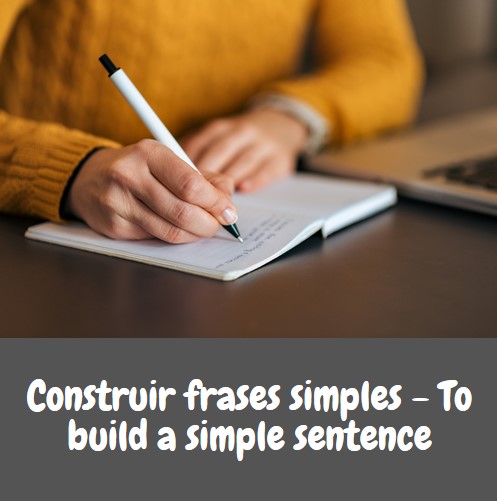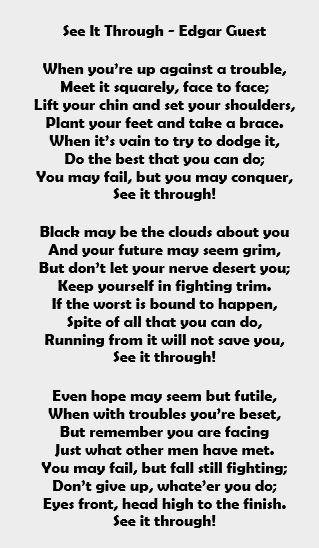
Recursos Educativos en Inglés - Poems in English - Poesías en inglés
The Bells - Edgar Allan Poe
I
Hear the sledges with the bells -
Silver bells!
What a world of merriment their melody foretells!
How they tinkle, tinkle, tinkle,
In the icy air of night!
While the stars that oversprinkle
All the heavens seem to twinkle
With a crystalline delight;
Keeping time, time, time,
In a sort of Runic rhyme,
To the tintinnabulation that so musically wells
From the bells, bells, bells, bells,
Bells, bells, bells -
From the jingling and the tinkling of the bells.
II
Hear the mellow wedding bells -
Golden bells!
What a world of happiness their harmony foretells!
Through the balmy air of night
How they ring out their delight!
From the molten-golden notes,
And all in tune,
What a liquid ditty floats
To the turtle-dove that listens, while she gloats
On the moon!
Oh, from out the sounding cells
What a gush of euphony voluminously wells!
How it swells!
How it dwells
On the Future! -how it tells
Of the rapture that impels
To the swinging and the ringing
Of the bells, bells, bells,
Of the bells, bells, bells, bells,
Bells, bells, bells -
To the rhyming and the chiming of the bells!
III
Hear the loud alarum bells -
Brazen bells!
What a tale of terror, now, their turbulency tells!
In the startled ear of night
How they scream out their affright!
Too much horrified to speak,
They can only shriek, shriek,
Out of tune,
In a clamorous appealing to the mercy of the fire,
In a mad expostulation with the deaf and frantic fire,
Leaping higher, higher, higher,
With a desperate desire,
And a resolute endeavor
Now -now to sit or never,
By the side of the pale-faced moon.
Oh, the bells, bells, bells!
What a tale their terror tells
Of despair!
How they clang, and clash, and roar!
What a horror they outpour
On the bosom of the palpitating air!
Yet the ear it fully knows,
By the twanging
And the clanging,
How the danger ebbs and flows;
Yet the ear distinctly tells,
In the jangling
And the wrangling,
How the danger sinks and swells,
By the sinking or the swelling in the anger of the bells -
Of the bells,
Of the bells, bells, bells, bells,
Bells, bells, bells -
In the clamor and the clangor of the bells!
IV
Hear the tolling of the bells -
Iron bells!
What a world of solemn thought their monody compels!
In the silence of the night,
How we shiver with affright
At the melancholy menace of their tone!
For every sound that floats
From the rust within their throats
Is a groan.
And the people -ah, the people -
They that dwell up in the steeple,
All alone,
And who tolling, tolling, tolling,
In that muffled monotone,
Feel a glory in so rolling
On the human heart a stone -
They are neither man nor woman -
They are neither brute nor human -
They are Ghouls:
And their king it is who tolls;
And he rolls, rolls, rolls,
Rolls
A paean from the bells!
And his merry bosom swells
With the paean of the bells!
And he dances, and he yells;
Keeping time, time, time,
In a sort of Runic rhyme,
To the paean of the bells,
Of the bells -
Keeping time, time, time,
In a sort of Runic rhyme,
To the throbbing of the bells,
Of the bells, bells, bells -
To the sobbing of the bells;
Keeping time, time, time,
As he knells, knells, knells,
In a happy Runic rhyme,
To the rolling of the bells,
Of the bells, bells, bells -
To the tolling of the bells,
Of the bells, bells, bells, bells,
Bells, bells, bells -
To the moaning and the groaning of the bells.
A Valentine - Edgar Allan Poe
For her this rhyme is penned, whose luminous eyes,
Brightly expressive as the twins of Leda,
Shall find her own sweet name, that nestling lies
Upon the page, enwrapped from every reader.
Search narrowly the lines!- they hold a treasure
Divine- a talisman- an amulet
That must be worn at heart. Search well the measure-
The words- the syllables! Do not forget
The trivialest point, or you may lose your labor
And yet there is in this no Gordian knot
Which one might not undo without a sabre,
If one could merely comprehend the plot.
Enwritten upon the leaf where now are peering
Eyes scintillating soul, there lie perdus
Three eloquent words oft uttered in the hearing
Of poets, by poets- as the name is a poet's, too,
Its letters, although naturally lying
Like the knight Pinto- Mendez Ferdinando-
Still form a synonym for Truth- Cease trying!
You will not read the riddle, though you do the best you can do.
A Dream Within A Dream - Edgar Allan Poe
Take this kiss upon the brow!
And, in parting from you now,
Thus much let me avow-
You are not wrong, who deem
That my days have been a dream;
Yet if hope has flown away
In a night, or in a day,
In a vision, or in none,
Is it therefore the less gone?
All that we see or seem
Is but a dream within a dream.
I stand amid the roar
Of a surf-tormented shore,
And I hold within my hand
Grains of the golden sand-
How few! yet how they creep
Through my fingers to the deep,
While I weep- while I weep!
O God! can I not grasp
Them with a tighter clasp?
O God! can I not save
One from the pitiless wave?
Is all that we see or seem
But a dream within a dream?
The Raven - Edgar Allan Poe
Once upon a midnight dreary, while I pondered, weak and weary,
Over many a quaint and curious volume of forgotten lore--
While I nodded, nearly napping, suddenly there came a tapping,
As of some one gently rapping, rapping at my chamber door.
"'Tis some visiter," I muttered, "tapping at my chamber door--
Only this and nothing more."
Ah, distinctly I remember it was in the bleak December;
And each separate dying ember wrought its ghost upon the floor.
Eagerly I wished the morrow;--vainly I had sought to borrow
From my books surcease of sorrow--sorrow for the lost Lenore--
For the rare and radiant maiden whom the angels name Lenore--
Nameless here for evermore.
And the silken, sad, uncertain rustling of each purple curtain
Thrilled me--filled me with fantastic terrors never felt before;
So that now, to still the beating of my heart, I stood repeating
"'Tis some visiter entreating entrance at my chamber door--
Some late visiter entreating entrance at my chamber door;--
This it is and nothing more."
Presently my soul grew stronger; hesitating then no longer,
"Sir," said I, "or Madam, truly your forgiveness I implore;
But the fact is I was napping, and so gently you came rapping,
And so faintly you came tapping, tapping at my chamber door,
That I scarce was sure I heard you"--here I opened wide the door;--
Darkness there and nothing more.
Deep into that darkness peering, long I stood there wondering, fearing,
Doubting, dreaming dreams no mortal ever dared to dream before;
But the silence was unbroken, and the stillness gave no token,
And the only word there spoken was the whispered word, "Lenore?"
This I whispered, and an echo murmured back the word, "Lenore!"--
Merely this and nothing more.
Back into the chamber turning, all my soul within me burning,
Soon again I heard a tapping somewhat louder than before.
"Surely," said I, "surely that is something at my window lattice;
Let me see, then, what thereat is, and this mystery explore--
Let my heart be still a moment and this mystery explore;--
'Tis the wind and nothing more!"
Open here I flung the shutter, when, with many a flirt and flutter,
In there stepped a stately Raven of the saintly days of yore;
Not the least obeisance made he; not a minute stopped or stayed he;
But, with mien of lord or lady, perched above my chamber door--
Perched upon a bust of Pallas just above my chamber door--
Perched, and sat, and nothing more.
Then this ebony bird beguiling my sad fancy into smiling,
By the grave and stern decorum of the countenance it wore,
"Though thy crest be shorn and shaven, thou," I said, "art sure no craven,
Ghastly grim and ancient Raven wandering from the Nightly shore--
Tell me what thy lordly name is on the Night's Plutonian shore!"
Quoth the Raven "Nevermore."
Much I marvelled this ungainly fowl to hear discourse so plainly,
Though its answer little meaning--little relevancy bore;
For we cannot help agreeing that no living human being
Ever yet was blessed with seeing bird above his chamber door--
Bird or beast upon the sculptured bust above his chamber door,
With such name as "Nevermore."
But the Raven, sitting lonely on the placid bust, spoke only
That one word, as if his soul in that one word he did outpour.
Nothing farther then he uttered--not a feather then he fluttered--
Till I scarcely more than muttered "Other friends have flown before--
On the morrow he will leave me, as my Hopes have flown before."
Then the bird said "Nevermore."
Startled at the stillness broken by reply so aptly spoken,
"Doubtless," said I, "what it utters is its only stock and store
Caught from some unhappy master whom unmerciful Disaster
Followed fast and followed faster till his songs one burden bore--
Till the dirges of his Hope that melancholy burden bore
Of ‘Never--nevermore'."
But the Raven still beguiling all my fancy into smiling,
Straight I wheeled a cushioned seat in front of bird, and bust and door;
Then, upon the velvet sinking, I betook myself to linking
Fancy unto fancy, thinking what this ominous bird of yore--
What this grim, ungainly, ghastly, gaunt, and ominous bird of yore
Meant in croaking "Nevermore."
This I sat engaged in guessing, but no syllable expressing
To the fowl whose fiery eyes now burned into my bosom's core;
This and more I sat divining, with my head at ease reclining
On the cushion's velvet lining that the lamp-light gloated o'er,
But whose velvet-violet lining with the lamp-light gloating o'er,
She shall press, ah, nevermore!
Then, methought, the air grew denser, perfumed from an unseen censer
Swung by Seraphim whose foot-falls tinkled on the tufted floor.
"Wretch," I cried, "thy God hath lent thee--by these angels he hath sent thee
Respite--respite and nepenthe from thy memories of Lenore;
Quaff, oh quaff this kind nepenthe and forget this lost Lenore!"
Quoth the Raven "Nevermore."
"Prophet!" said I, "thing of evil!--prophet still, if bird or devil!--
Whether Tempter sent, or whether tempest tossed thee here ashore,
Desolate yet all undaunted, on this desert land enchanted--
On this home by Horror haunted--tell me truly, I implore--
Is there--is there balm in Gilead?--tell me--tell me, I implore!"
Quoth the Raven "Nevermore."
"Prophet!" said I, "thing of evil!--prophet still, if bird or devil!
By that Heaven that bends above us--by that God we both adore--
Tell this soul with sorrow laden if, within the distant Aidenn,
It shall clasp a sainted maiden whom the angels name Lenore--
Clasp a rare and radiant maiden whom the angels name Lenore."
Quoth the Raven "Nevermore."
"Be that word our sign of parting, bird or fiend!" I shrieked, upstarting--
"Get thee back into the tempest and the Night's Plutonian shore!
Leave no black plume as a token of that lie thy soul hath spoken!
Leave my loneliness unbroken!--quit the bust above my door!
Take thy beak from out my heart, and take thy form from off my door!"
Quoth the Raven "Nevermore."
And the Raven, never flitting, still is sitting, still is sitting
On the pallid bust of Pallas just above my chamber door;
And his eyes have all the seeming of a demon's that is dreaming,
And the lamp-light o'er him streaming throws his shadow on the floor;
And my soul from out that shadow that lies floating on the floor
Shall be lifted--nevermore!
🔆 Read more Poems
Adblock test (Why?)






